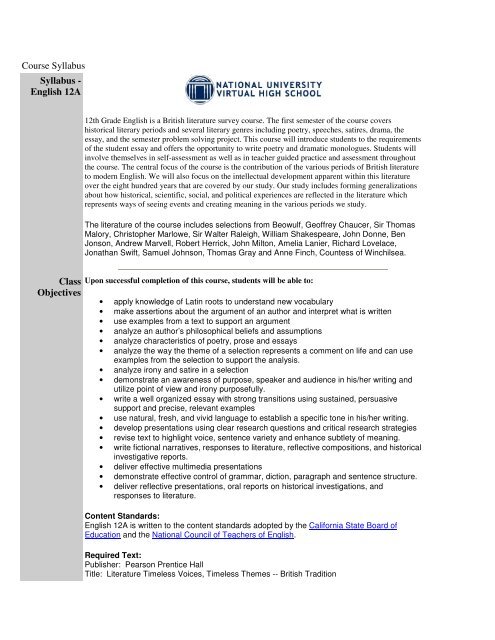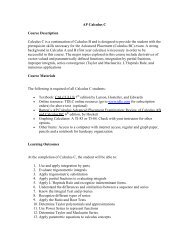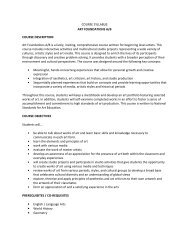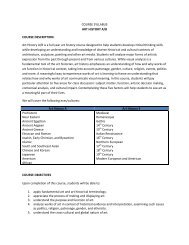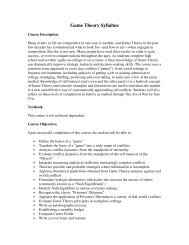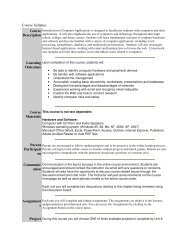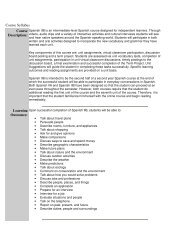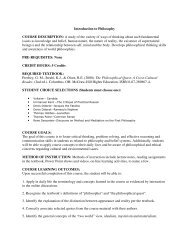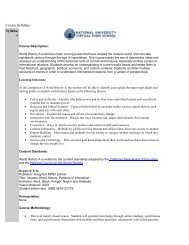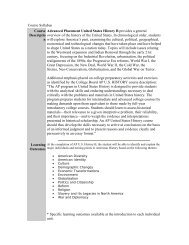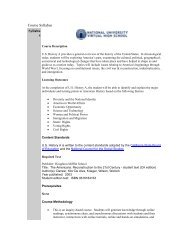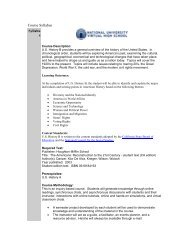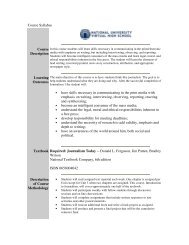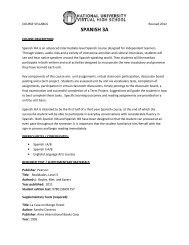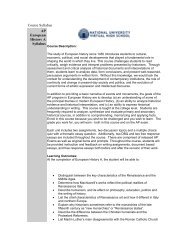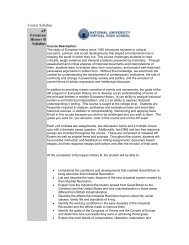Course Syllabus Syllabus - English 12A Class Objectives
Course Syllabus Syllabus - English 12A Class Objectives
Course Syllabus Syllabus - English 12A Class Objectives
Create successful ePaper yourself
Turn your PDF publications into a flip-book with our unique Google optimized e-Paper software.
<strong>Course</strong> <strong>Syllabus</strong><br />
<strong>Syllabus</strong> -<br />
<strong>English</strong> <strong>12A</strong><br />
12th Grade <strong>English</strong> is a British literature survey course. The first semester of the course covers<br />
historical literary periods and several literary genres including poetry, speeches, satires, drama, the<br />
essay, and the semester problem solving project. This course will introduce students to the requirements<br />
of the student essay and offers the opportunity to write poetry and dramatic monologues. Students will<br />
involve themselves in self-assessment as well as in teacher guided practice and assessment throughout<br />
the course. The central focus of the course is the contribution of the various periods of British literature<br />
to modern <strong>English</strong>. We will also focus on the intellectual development apparent within this literature<br />
over the eight hundred years that are covered by our study. Our study includes forming generalizations<br />
about how historical, scientific, social, and political experiences are reflected in the literature which<br />
represents ways of seeing events and creating meaning in the various periods we study.<br />
The literature of the course includes selections from Beowulf, Geoffrey Chaucer, Sir Thomas<br />
Malory, Christopher Marlowe, Sir Walter Raleigh, William Shakespeare, John Donne, Ben<br />
Jonson, Andrew Marvell, Robert Herrick, John Milton, Amelia Lanier, Richard Lovelace,<br />
Jonathan Swift, Samuel Johnson, Thomas Gray and Anne Finch, Countess of Winchilsea.<br />
<strong>Class</strong><br />
<strong>Objectives</strong><br />
Upon successful completion of this course, students will be able to:<br />
• apply knowledge of Latin roots to understand new vocabulary<br />
• make assertions about the argument of an author and interpret what is written<br />
• use examples from a text to support an argument<br />
• analyze an author’s philosophical beliefs and assumptions<br />
• analyze characteristics of poetry, prose and essays<br />
• analyze the way the theme of a selection represents a comment on life and can use<br />
examples from the selection to support the analysis.<br />
• analyze irony and satire in a selection<br />
• demonstrate an awareness of purpose, speaker and audience in his/her writing and<br />
utilize point of view and irony purposefully.<br />
• write a well organized essay with strong transitions using sustained, persuasive<br />
support and precise, relevant examples<br />
• use natural, fresh, and vivid language to establish a specific tone in his/her writing.<br />
• develop presentations using clear research questions and critical research strategies<br />
• revise text to highlight voice, sentence variety and enhance subtlety of meaning.<br />
• write fictional narratives, responses to literature, reflective compositions, and historical<br />
investigative reports.<br />
• deliver effective multimedia presentations<br />
• demonstrate effective control of grammar, diction, paragraph and sentence structure.<br />
• deliver reflective presentations, oral reports on historical investigations, and<br />
responses to literature.<br />
Content Standards:<br />
<strong>English</strong> <strong>12A</strong> is written to the content standards adopted by the California State Board of<br />
Education and the National Council of Teachers of <strong>English</strong>.<br />
Required Text:<br />
Publisher: Pearson Prentice Hall<br />
Title: Literature Timeless Voices, Timeless Themes -- British Tradition
Author(s): Kinsella, Carroll, Feldman, Stump, Wilson<br />
Year published: 2002<br />
Student edition text: ISBN 013054793X<br />
Year published: 2002<br />
Student edition text: ISBN 013054793X<br />
Prerequisites:<br />
<strong>English</strong> 9, <strong>English</strong> 10, and <strong>English</strong> 11<br />
Description of<br />
<strong>Class</strong><br />
Methodology<br />
• This is an inquiry-based course. Students will generate knowledge through online<br />
readings, synchronous chats, asynchronous discussions with students and their<br />
instructor, interactions with online tutorials, and online and hands-on simulations.<br />
• A semester project developed by each student will be used to demonstrate knowledge<br />
and understanding of the material in the course.<br />
• The instructor will act as a guide, a facilitator, an events planner, and a resource<br />
advisor. He/she will always be available through e-mail.<br />
• The student must actively construct and acquire knowledge by being intrinsically<br />
motivated to succeed. To succeed, students must participate and complete all<br />
readings and activities. This course requires the student’s active participation.<br />
• Both formal and informal assessment methods will be used in the course. Informal<br />
assessment will include an evaluation of the quality and timeliness of participation in<br />
class activities. Formal assessment may include multiple-choice quizzes, tests,<br />
discussion board participation, and written assignments. A final exam will be given at<br />
the end of the course.<br />
Unit Topics Assessments Activities Readings<br />
The introduction to<br />
British Literature<br />
Vocabulary<br />
Prewriting<br />
The Epic<br />
Vocabulary<br />
Comparison/contrast<br />
writing<br />
Essay questions<br />
Textbook questions<br />
Discussion questions<br />
Discussions about old<br />
<strong>English</strong> and it’s impact on<br />
modern <strong>English</strong><br />
Timelines for<br />
British Literature<br />
Changing <strong>English</strong><br />
Language<br />
from Beowulf<br />
Characterization in<br />
the Middle Ages<br />
Chaucer and the<br />
story poem<br />
Lyric Poetry<br />
Vocabulary<br />
Quiz over poetry<br />
Research<br />
assignment<br />
Vocabulary<br />
Sonnet essay<br />
Quiz over poetry<br />
Web research<br />
Persuasive writing or<br />
poetic writing<br />
Essay questions<br />
Textbook questions<br />
Discussion questions<br />
Discussions about the<br />
character of middle class<br />
Britons during the middle<br />
ages and how similar they<br />
are to modern middle<br />
class Americans<br />
Response to poetry essay<br />
Essay questions<br />
Textbook questions<br />
From Canterbury<br />
Tales<br />
Women in<br />
Medieval Culture<br />
The Changing<br />
<strong>English</strong> Language<br />
Timeline for British
Shakespearean<br />
Sonnet<br />
4 Macbeth<br />
Renaissance<br />
tragedy<br />
5 Civil War, The<br />
Turbulent Time<br />
Lyric Poetry<br />
Vocabulary<br />
Quiz<br />
Response to<br />
literature essay<br />
Vocabulary<br />
Midterm<br />
Essay on extended<br />
metaphor<br />
6 Reformation Summarizing<br />
Quiz<br />
Write a poem<br />
Discussion questions<br />
Discussions about the<br />
tone and topics of sonnets<br />
as they reflect modern<br />
attitudes<br />
Essay revision<br />
Essay questions<br />
Textbook questions<br />
Discussion questions<br />
Discussions about<br />
relationship between<br />
Renaissance tragedy and<br />
modern tragic characters<br />
Essay revision<br />
Discussion of the<br />
extended metaphor<br />
Textbook questions<br />
Discussion questions<br />
Essay Revision<br />
Discussion of semester<br />
problem solving project<br />
Textbook questions<br />
Discussion questions<br />
Discussions about<br />
Semester Problem<br />
Solving Project<br />
Discussion on how<br />
reformation attitudes<br />
impact on modern<br />
perception of gender roles<br />
Literature<br />
The Passionate<br />
Shepherd to His<br />
Love<br />
The Nymph’s<br />
Reply to the<br />
Shepherd<br />
Shakespeare<br />
Sonnet 29<br />
Shakespeare<br />
sonnet 130<br />
Macbeth<br />
Timelines for<br />
British Literature<br />
The Changing<br />
<strong>English</strong> Language<br />
The Bait<br />
Meditation<br />
Song: To Celia<br />
To His Coy<br />
Mistress<br />
from Paradise<br />
Lost<br />
Eve’s apology in<br />
Defense of<br />
Women<br />
To Lucasta, On<br />
Going to the Wars<br />
To Althea, from<br />
Prison<br />
7 Satire in the Age of<br />
Reason<br />
The Dictionary<br />
Vocabulary<br />
Quiz<br />
Research results<br />
Research on vocabulary<br />
Textbook questions<br />
Discussion questions<br />
Discussions about impact<br />
of early dictionary on<br />
modern usage<br />
Work on semester<br />
problem solving project<br />
Gulliver’s Travels<br />
Elegy Written in a<br />
Country<br />
Churchyard<br />
A Nocturnal<br />
Reverie<br />
from A Dictionary<br />
8 Assessment of<br />
interpretative skills<br />
learned during the<br />
semester<br />
Essay exams:<br />
Reading<br />
Writing<br />
Self Assessment<br />
Problem solving<br />
Discussion questions<br />
Presentation of Semester<br />
Problem Solving Project<br />
Student input into projects<br />
of all students<br />
Knights of Legend<br />
Medieval<br />
Romance<br />
Sir Gawain and<br />
the Green Knight
Assessment of<br />
communication<br />
skills learned<br />
during the<br />
semester<br />
Project Self Assessment Student Projects<br />
Self Assessment<br />
document<br />
Assessment<br />
Assignments<br />
Assignments<br />
1 point each (6-8 per unit)<br />
Major Writing Assignments 5 points each (1 per unit)<br />
Discussion Board Prompts 2 points each (1-2 per unit)<br />
Problem Solving Project 14 points (Unit 8)<br />
Final Exam - Reading 5 points each (Unit 8)<br />
Final Exam - Writing 5 points each (Unit 8)<br />
Final Exam - Literary Terms 5 points each (Unit 8)<br />
Final Exam - Vocabulary 5 points each (Unit 8)<br />
Grading Scale<br />
Letter Grade Percentage Earned<br />
A 90% - 100%<br />
B 80% - 89%<br />
C 70% - 79%<br />
D 60% - 69%<br />
F<br />
59% and lower<br />
Student’s<br />
Role and<br />
Responsibiliti<br />
es in this<br />
<strong>Course</strong><br />
Expectations:<br />
Students are expected to conduct themselves in a responsible manner that reflects sound<br />
ethics, honor, and good citizenship. It is the student’s responsibility to maintain academic<br />
honesty and integrity and to manifest their commitment to the goals of NUVHS through their<br />
conduct and behavior. Students are expected to abide by all NUVHS policies and regulations.<br />
Any form of academic dishonesty, or inappropriate conduct by students or applicants may<br />
result in penalties ranging from warning to dismissal, as deemed appropriate by NUVHS.<br />
Communication:<br />
Throughout this course students will need to be in close contact with their instructor and fellow<br />
students. Students are expected to communicate via email and electronic discussion boards.<br />
Therefore, students should plan on checking email at least three times a week and participate<br />
in the discussion boards during the weeks they are live.<br />
Instructors strongly encourage and welcome open communication. Clear, consistent, and<br />
proactive communication will ensure a successful experience in this course. It is the student’s<br />
responsibility to notify the instructor immediately if and when a personal situation occurs that
affects his/her performance in this class. Being proactive with communication will result in a<br />
quick solution to any problems that may occur.<br />
Technical Support is offered through Spectrum Pacific Learning Company (SPLC). Should a<br />
student need any technical assistance, he/she should email the Help Desk as soon as<br />
possible at helpdesk@myonlinelogin.com or call 1-877-533-4733. SPLC will help resolve<br />
technical problems and walk through the solution with students. If a problem persists for more<br />
than 48 hours, the student must also notify his/her teachers and NUVHS.<br />
Time Required For This <strong>Course</strong>:<br />
To complete this course in eight weeks, students should plan to allocate at least 12-15 hours<br />
per unit on assigned readings, assignments, discussions (asynchronous and synchronous),<br />
and exams. It is highly recommended that students organize themselves around the course<br />
schedule.<br />
NUVHS<br />
Expected<br />
Schoolwide<br />
Learning<br />
Results<br />
(ESLRs)<br />
NUVHS Expected Schoolwide Learning Results (ESLRs):<br />
It is anticipated that NUVHS students will be:<br />
Engaged Learners<br />
1. Demonstrate self-directed learning skills such as time management, and personal responsibility<br />
through the completion of course requirements<br />
2. Develop an understanding of their own preferred learning styles to enhance their overall<br />
academic potential<br />
3. Incorporate effective and relevant internet and multimedia resources in their learning process to<br />
broaden their knowledge base<br />
Critical Thinkers<br />
1. Effectively analyze and articulate sound opinions on a variety of complex concepts<br />
2. Illustrate a variety of problem-solving strategies that strengthen college preparation and<br />
workforce readiness<br />
3. Formulate a framework for applying a variety of technology and internet-based research to<br />
enhance information literacy and collaborative thinking<br />
Effective Communicators<br />
1. Demonstrate awareness and sensitivity to tone and voice in multiple forms of communication<br />
2. Express concepts and ideas in a variety of forms<br />
3. Enhance communiccation skills through the use of media rich or other technology resources<br />
Global Citizens<br />
1. Appreciate the value of diversity<br />
2. Understand the range of local and international issues facing today's global community<br />
3. Demonstrate awareness of the importance of cultural sensitivity and social responsibility in the<br />
21st century


